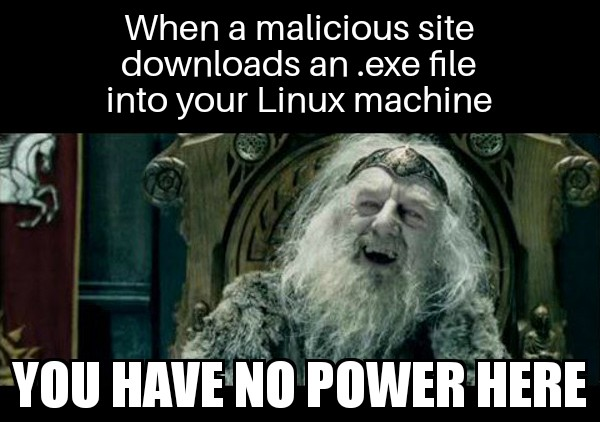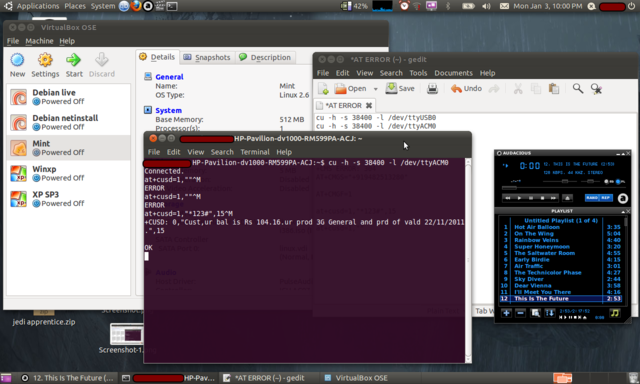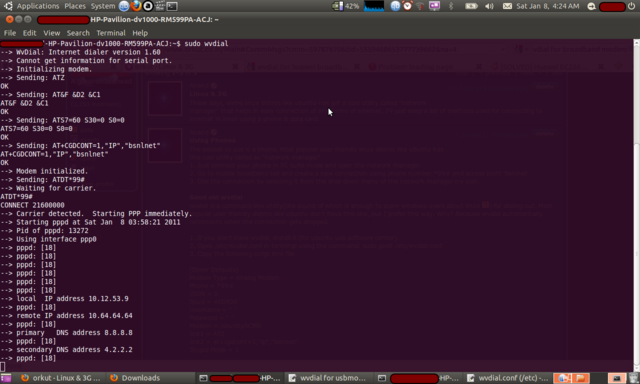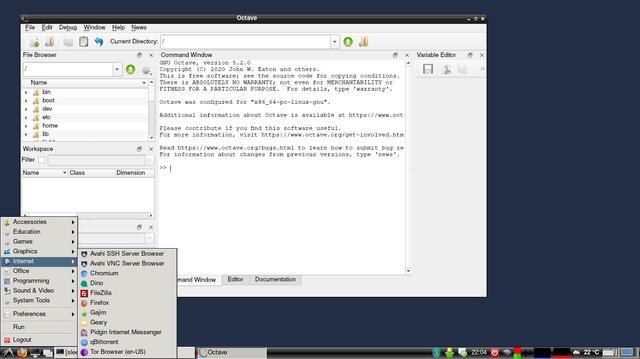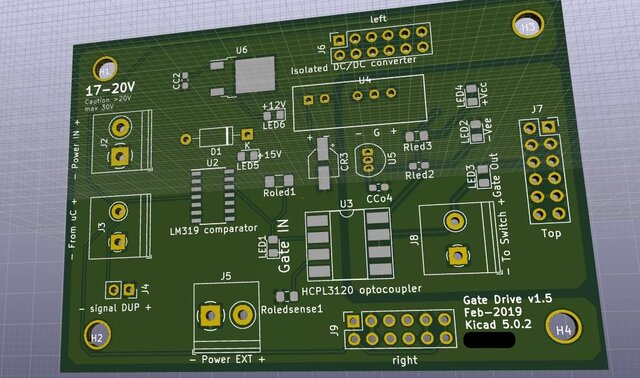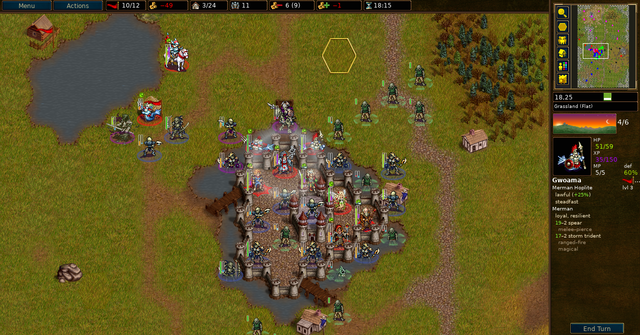My journey in GNU/Linux and Free Software
Published on
I've been using GNU/Linux operating system for about 13 years and it has been an important part of my computing. Hence I thought that I'd start by writing about how I came to use it and what I'm using it for. Writing this has resulted in me digging history, both from the recesses of my mind and my laptop.
I first heard about GNU/Linux from Richard Stallman in 2007. I was doing my bacherlor's in electrical engineering at that time. I was in my second or third year. My college has various cultural/tech events every year. During one such event, Richard Stallman the then president of Free Software Foundation was invited to give a talk on free software. I just happened to be in the talk for no particular reason (was just accompanying my friends, who had no idea what the event was about either). I didn't even have a personal computer of my own. My desktop computer was at home far, far away and I was staying in college's hostel. Few people, even those who studied computer science owned a personal computer back then, let alone have parents buying for them to take to hostel. It was a luxury. (It changed with time after free laptop scheme by Tamil Nadu govt in 2011).
So, I attended the video talk that was broadcast over a 384 Kbps video link. Richard Stallman explained about philosophy of free software and the philosophical opposition to proprietary software. He was serious at times and also managed to make the audience laugh many times too. The video link was rather unstable and would frequently disconnect. During that talk I didn't get much from it. I had only heard of the term free software and thought that free software was software that was free of charge and also something about code being open. Also about GNU/Linux. I've learnt about it in college before – in an coursework on operating systems (was quite boring). But this talk was one of the triggers for me to try it out. Also the fact that you can have free operating systems.
Later that saw one of my friends use Ubuntu Linux (probably v7.04) operating system (distro). It made me try it - I burned the ubuntu ISO in a 700 MB CD and booted a live session my computer. My computer was a desktop computer, with a 2.4 Ghz Intel Celeron processor (single core), 512 MB RAM and about 80 GB HDD. I don't remember my first impressions of Ubuntu very much. It was a different experience to see an operating system running of a CD/DVD drive. After trying the live session for a bit, I stopped using it for a while as I had a campus placement ot study for.
I started using GNU/Linux again in late 2008 after my campus placement was over. Windows XP, my main operating system did not give a very good experience - it slowed down frequently and I had to reinstall it everytime it slows down. Also, my celeron processor was not as fast as pentium one. I was looking for really small and lightweight GNU/Linux distros. I had only a 60 Kbps 2.75 EGPRS internet connection too. I came across a small distro called Damn Small Linux, which I discovered was named appropriately. The entire operating system was just 50 MB in size! It could boot from my pen drive, had a audio player (XMMS), all required drivers and even had Firefox in it (right now firefox itself is more than 50 MB). It was much faster than my clumsy and larger windows XP.
After playing a bit with Damn Small Linux, I looked for an distro with little more features, while being light. I came across Puppy Linux. It was a bit larger - 100 MB in 2009. I could load it into my 4 GB pen drive and boot it from there. It had an unique feature - the entire 100 MB operating system loads into the computer's RAM during boot and pen drive can be removed. It was as fast as Damn Small Linux and had a media player, firefox and basic document editor (Abiword) preinstalled. Additional software like VLC media player could be easily installed from the official Puppy Linux repository. This method of software installation was new to me - in windows I downloaded software from a website and install it. Here, the major way of installing new software was from the official repository of the distro with the help of a software manager. Puppy Linux became my main operating system for a while. I remember watching the Star Wars Original Trilogy using VLC media player there. I learnt to connect my Nokia 5200 phone to internet using wvdial, a commandline utility. It was fascinating to connect via commandline (though it took some effort to find the right script to connect). Another good thing about GNU/Linux in general is that it is immune to most Windows viruses. I didn't even require an antivirus software. Viruses were no threat.
Compared to Ubuntu, puppy linux was a bit harder to use, but its speed was what I needed. It also did not need a full install and could be run from the pen drive (did not have a recommended full install). There were various "puplets" which are derivations of the official Puppy Linux distros. I tried some of them also. In one such distro, there was Wine, from which I could run some Windows games that I liked. I also came to understand about Desktop Environments and how they are responsible for graphical interface. It made me see an operating system as modular, made of many softwares working together, instead of one big blackbox as in Windows.
After this, in second half of 2009, I was now at home and I had a laptop. It was a HP Pavillion series laptop with 1.86 Ghz Pentium T1350 processor, 2.5 GB RAM and 60 GB HDD. The laptop was faster than my desktop computer because of a superior processor. I could install Ubuntu Linux v9.04 and it worked quite fast. The laptop had about 15 GB HDD space allocated for windows recovery, which I deleted and used for installing Ubuntu. I also had a 256 Kbps broadband connection at home, which was quite fast (in 2009). Ubuntu at that time felt like a complete operating system unlike Damn small linux which lacked many softwares or Puppy Linux which could not be installed into hard drive (at that time it was not recommended). I have also tried derivatives of official Ubuntu releases - Xubuntu, based on the XFCE desktop environment, which was lighter than the standard GNOME desktop environment, Lubuntu based on the even lighter LXDE desktop environment.
My brother went to college and I gave my desktop computer to him. I taught my brother how to use Ubuntu GNU/Linux (v9.04) as by this time my computer's hardware was so bad that windows wouldn't work at all. Even getting ubuntu to work required some effort, but I managed to do it and teach him. He was fascinated by Ubuntu after years of using and programming in Windows. He would go onto contribute to free software.
I also tried Linux Mint, which was another distro based on Debian GNU/Linux and Ubuntu. I've also tried Debian GNU/Linux itself, though I found it harder to use than Ubuntu. During this time, I spent quite a bit of time making friends with some people over the social media site Orkut. I taught 2 people on how to use Ubuntu Linux. One person in Hyderabad. Another was a person in the state of Punjab. I also taught my best friend from college on how to use Ubuntu.
For another 3 years, I used Ubuntu or Linux mint. I was working in a IT services company until 2011. At work, I had to use Windows XP. However the client I was working for had Red Hat Enterprise Linux servers for running Oracle databases. Part of my job involved executing scripts in those servers for deploying new code. In 2012, when I was doing my Master's degree, I attended a talk by Richard Stallman who came to IIT Madras. By that time I had understood even more about the philosophy of free software and clearly understood that it is not freeware. I prepared my Master's thesis and presentation by using Libre Office, which was an alternative to MS office. My internet access was from the 3G networks at that time, which I connected to by using my Nokia N79 phone or 3G Huwei USB dongle. I used wvdial to dial and connect.
In late 2013, my brother (a much more accomplished GNU/Linux user than me) made me to use Arch Linux. Arch linux relied a lot on commandline to get basic things like installing software, but once I got used to it, it was easy. I used an LXDE desktop environment and it was quite lightweight. After my laptop boots, a fresh installation uses just 80 MB of memory (200 MB at 2020). That was better than Windows 7 using 1 GB for no good reason. Arch Linux also had a rolling release update model, hence I did not need to reinstall the operating system every year, unlike ubuntu short term releases. I have used Arch Linux for 6 years without needing to reinstall. Arch Linux, once I got used to it becomes very easy to use and it has been my main operating system for a long time. I however have a Windows 7 installation for playing some old Windows games.
When doing my PhD on electrical engineering, I was much more committed to the philosophy of free software and I tried to use as much free software as possible. I used LaTeX document preparation system for writing my papers. It was a significant improvement over Libre office or MS office and produced high quality paper outputs. In fact, it was one of the greatest ever free software that I've used. I have made Masters and Bachelors students working with me to use LaTeX to write their final year thesis and they have found it useful. I used Python instead of MATLAB software for numerical computations. I had already abandoned the use of Simulink and using MATLAB programming instead for simulating circuits. Hence, the transition was easy. Then there's KiCad, which is another free software that I used for designing PCBs for hardware projects in my PhD.
I've installed Arch Linux for two of my juniors. They had a misbehaving Dell Inspiron laptop. One person had a dead RAM slot and another person had a faulty hard disk controller that creates high amount of random read errors (looking at SMART data). Arch Linux worked well in both cases, in part because of file system cache (windows seems to read into HDD way too many times). Although Arch immediately solved their problem, they found it hard to use commandline. They did not regularly update and probably didn't continue using Linux after they left college. I met other users of Linux in Tamil Nadu through Free Software Foundation Tamil Nadu (FSFTN). During this time, I came across many free software games - Chromium-bsu, Megaglest, Battle for Wesnoth, unknown-horizons and 0ad. I've been greatly impressed by Battle for Wesnoth, a turn based strategy game. I play it regularly.
My HP Laptop stopped working in 2014 and I got a second hand Lenovo Thinkpad T420. I bought it from a shop in Madurai through Olx at May 2015. Before purchasing it, I used my mother's Acer laptop. The Arch Linux in my hard disk was able to easily transition to new laptops. I finished my PhD in 2020. I wrote my PhD thesis using LaTeX and the presentation for my final thesis using LaTeX Beamer. Its a nice feeling to do most of my PhD work using GNU/Linux and other free software. I hope that the World adopts the philosophy of free software more.
